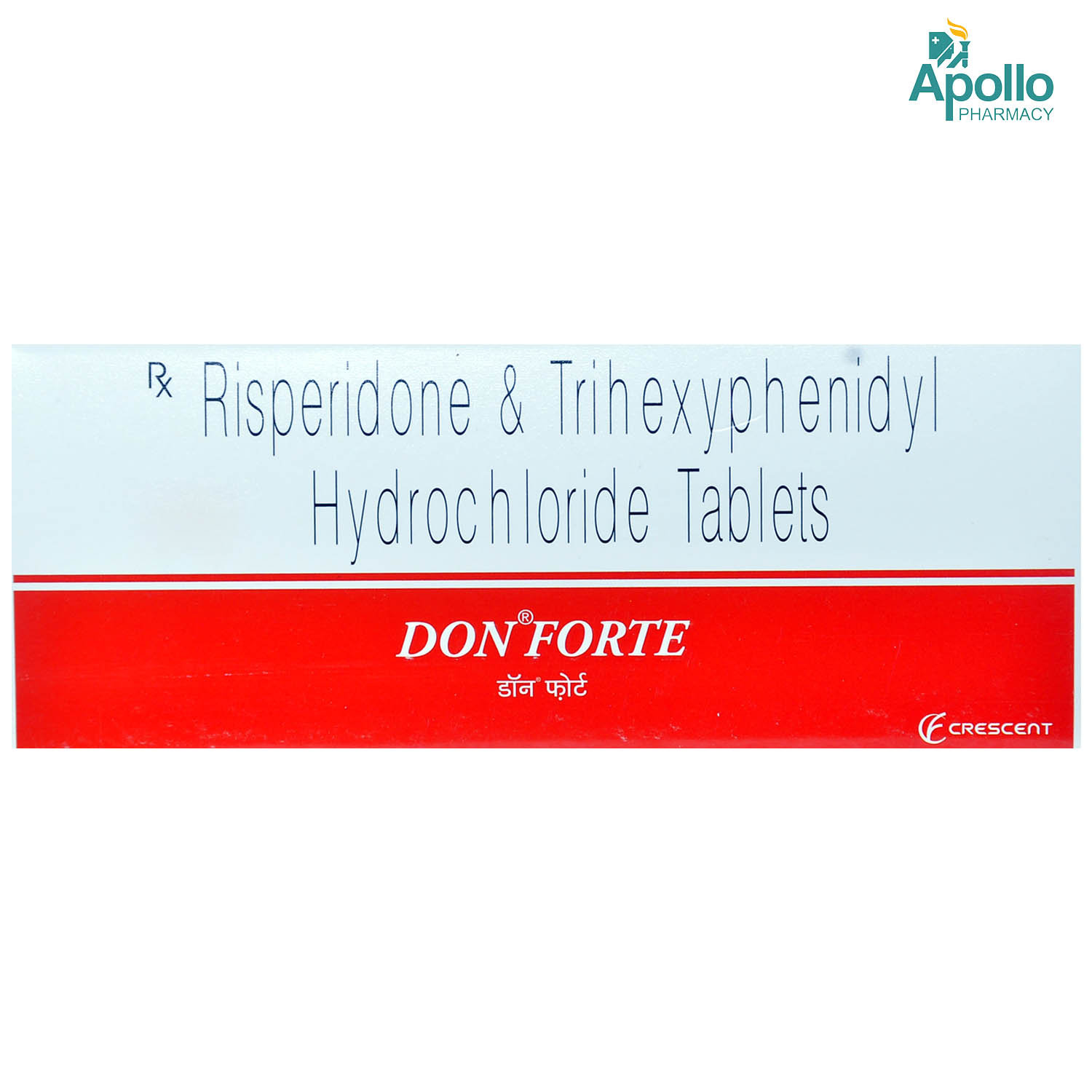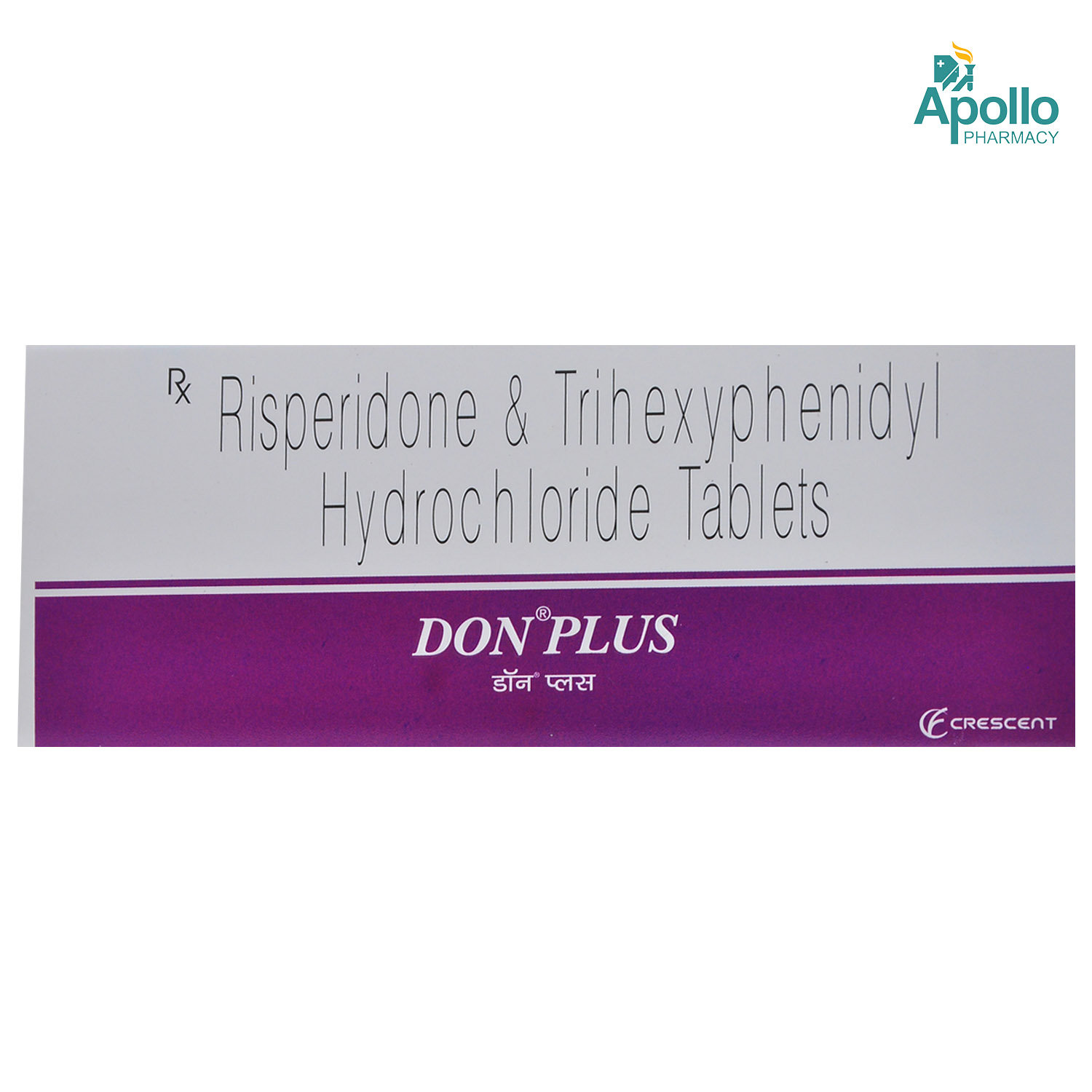Risperidone+trihexyphenidyl
About Risperidone+trihexyphenidyl
Risperidone+trihexyphenidyl belongs to the class of antipsychotic drugs primarily used to treat schizophrenia. Schizophrenia is a condition that affects the way your brain processes information. It causes you to lose touch with reality. You might see, hear, or believe things that are not real. Schizophrenia is a symptom, not an illness. A mental or physical illness, substance abuse, or extreme stress or trauma can cause it.
Risperidone+trihexyphenidyl is a fixed-dose combination composed of two medicines, namely, Risperidone and, Trihexyphenidyl. Risperidone belongs to a group of drugs called atypical antipsychotics. Risperidone decreases dopaminergic and serotonergic activity in the brain, which reduces the symptoms of schizophrenia and mood disorders. Trihexyphenidyl is in a category of medicines called antimuscarinic drugs. It acts on the nervous system and corrects some of the chemical imbalances that cause Parkinson's disease and some side effects that arise during antipsychotic treatment.
Risperidone+trihexyphenidyl is available in the form of oral tablets. It is dissolved in the mouth with the help of water. It can take two times a day, as prescribed by a doctor. Your doctor will decide the dosage based on your medical condition. In some cases, Risperidone+trihexyphenidyl can cause side effects like nausea, constipation, dry mouth, weight gain, sleepiness, orthostatic hypotension (sudden lowering of blood pressure on standing), and nervousness. Most of these side effects of Risperidone+trihexyphenidyl do not require medical attention and gradually resolve over time. However, if these side effects persist longer, please consult your doctor.
If you are known to be allergic to Risperidone+trihexyphenidyl or any other medicines, please inform your doctor. Before taking Risperidone+trihexyphenidyl, let your doctor know if you have diabetes, heart disease, tardive dyskinesia (movement of face and jaw), or liver and kidney problems. A woman who is pregnant, thinking of being pregnant, breastfeeding, or planning to be pregnant is not allowed to take this medicine, so tell your doctor before taking this medicine. Please do not stop taking Risperidone+trihexyphenidyl on your own, as it may lead to the recurrence of symptoms or worsen the condition.
Uses of Risperidone+trihexyphenidyl
Medicinal Benefits
Risperidone+trihexyphenidyl is used to treat schizophrenia (A mental illness in which a person is confused). Risperidone+trihexyphenidyl is a fixed-dose combination composed of two different medicines, namely, Risperidone and, Trihexyphenidyl. Risperidone is an atypical antipsychotic that acts by regulating the levels of chemical messengers (dopamine and serotonin) to enhance mood, perception and behaviour. Trihexyphenidyl is an anticholinergic agent that works on the nervous system and corrects some of the chemical imbalances that cause Parkinson's disease and some side effects that arise during antipsychotic treatment.
Directions for Use
Storage
Side Effects of Risperidone+trihexyphenidyl
- Nausea
- Constipation
- Dryness in the mouth
- Weight gain
- Sleepiness
- Orthostatic hypotension (sudden lowering of blood pressure on standing)
- Nervousness
Drug Warnings
Before taking Risperidone+trihexyphenidyl, inform your doctor if you are allergic to it or if you have any other allergies. This product may contain inactive ingredients, which can cause allergic reactions or other problems. Before using this Risperidone+trihexyphenidyl, inform your doctor of your medical history like, liver and kidney problems, difficulty in swallowing, family history of diabetes, eye problems, and heart problems. This drug makes you dizzy. Alcohol can make you more dizzy or drowsy. Do not drive or do anything that needs alertness until you can do it safely. A woman who is pregnant or thinking of being pregnant, breastfeeding, or trying to be pregnant is not permitted to take this medication, so inform your doctor before taking this medicine.
Drug Interactions
Drug-Drug Interactions: Risperidone+trihexyphenidyl may interact with antidepressants (amitriptyline), medications used to treat mental illness (chlorpromazine, thioridazine, clozapine), medicines used to treat an irregular heartbeat (disopyramide), medications used to treat Parkinson's disease (levodopa), drugs used to treat viral infections (amantadine), a medicine for treating some conditions (rifampicin), drugs used to treat epilepsy (carbamazepine, phenytoin), and medications used to treat used for certain types of heart disease (quinidine).
Drug-Food Interactions:Risperidone+trihexyphenidyl may interact with alcohol and cause serious addiction, so one should not consume alcohol.
Drug-Disease Interactions: The use of the name is restricted in medical conditions, including narrow-angle glaucoma, diabetics, epilepsy, prolonged or painful erection, kidney problems, liver problems, high level of the hormone prolactin in your blood or if you have a tumour, dementia caused by stroke.
Drug-Drug Interactions Checker List:
Safety Advice

Alcohol
unsafeIt is unsafe to consume alcohol, since alcohol consumption with Risperidone+trihexyphenidyl may increase the risk of dizziness, fainting, or headache.

Pregnancy
unsafeRisperidone+trihexyphenidyl is not safe in pregnancy because it causes miscarriage and abnormalities in the fetus.

Breast Feeding
cautionThere is no evidence on how Risperidone+trihexyphenidyl affects breastfeeding. Please consult your doctor before taking Risperidone+trihexyphenidyl if you are breastfeeding.

Driving
cautionRisperidone+trihexyphenidyl is not safe during the drive because it can make you feel drowsy. So, you should do not do anything that requires concentration and attention.

Liver
cautionRisperidone+trihexyphenidyl to be taken with caution, especially if you have a history of liver diseases/conditions. The dose may have to be adjusted by your doctor.

Kidney
cautionRisperidone+trihexyphenidyl to be taken with caution, especially if you have a history of kidney diseases/conditions. The dose may have to be adjusted by your doctor.

Children
unsafeIt is not recommended for children below 12 years. Risperidone+trihexyphenidyl is used to treat only above 12 years of age.
Habit Forming
Diet & Lifestyle Advise
- Monitor your mood. Keep track of your mood regularly, including factors such as sleep, medicine and activities that can impact your mood. Exercise daily.
- Exercise is nice to relieve tension. It can also avoid the weight gain that can be a side effect of your bipolar medication.
- You may also practice calming techniques such as meditation and deep breathing exercises.
- Get some normal sleep. Having enough sleep will help to stabilize your mood.
- Eat a healthy diet. Certain foods may affect your mood more than others. Consider keeping a food log to track what you eat and how certain foods make you feel. Talk to your doctor or nutritionist about foods that may help stabilize your mood.
- Stay optimistic. It will take time for your symptoms to improve after you start bipolar therapy, but you will feel relaxed knowing that you will get better and that the worst is most definitely behind you.
- A person should take a healthy diet that includes lots of fruits and vegetables, lean meats, skinless poultry, nuts, fish, whole grains, plant-based oils and low-fat dairy products will help to keep a person in good health.
Special Advise
Patients Concern
Disease/Condition Glossary
Schizophrenia: It is a severe mental illness in which the person may see, hear or feel things that are not there, believe things that are not true, or feel unusually suspicious or confused. Schizophrenia is a long-term disease that affects brain functioning. People with schizophrenia may seem like they have lost touch with reality which might cause significant distress for the individual, their friends and family. The exact cause is unknown; however, conditions like genetics, environment, brain structure and function could be the risk factors. Symptoms include hallucinations, delusions, thought disorders, movement disorders, disorganised thinking, loss of interest, lack of emotions, etc.
FAQs
Risperidone+trihexyphenidyl is used to treat schizophrenia (A mental illness in which a person is confused). Risperidone+trihexyphenidyl is composed of two different medicines, namely, Risperidone and, Trihexyphenidyl. Risperidone is an atypical antipsychotic that acts by regulating the levels of chemical messengers (dopamine and serotonin) to enhance mood, perception and behaviour. Trihexyphenidyl is an anticholinergic agent that acts on the nervous system and corrects some of the chemical imbalances that cause Parkinson's disease and some side effects that arise during antipsychotic treatment.
Yes, Risperidone+trihexyphenidyl is used to help weight gain and it is not necessary for all people to experience the side effect. It is advisable to follow a regular diet and exercise to maintain a healthy weight.
Do not stop using Risperidone+trihexyphenidyl even if you feel better. It should be strictly used as advised by your doctor to avoid the recurrence of symptoms and worsening of the disease.
Not safe because Risperidone+trihexyphenidyl is not safe in pregnancy because it causes miscarriage and abnormalities in the fetus.
There is no evidence on how Risperidone+trihexyphenidyl affects breastfeeding. Please consult your doctor before taking Risperidone+trihexyphenidyl if you are breastfeeding.
Stopping the Risperidone+trihexyphenidyl abruptly can cause withdrawal symptoms, and preventing it too early could make your illness come back. Please consult your doctor if you want to stop taking Risperidone+trihexyphenidyl.





